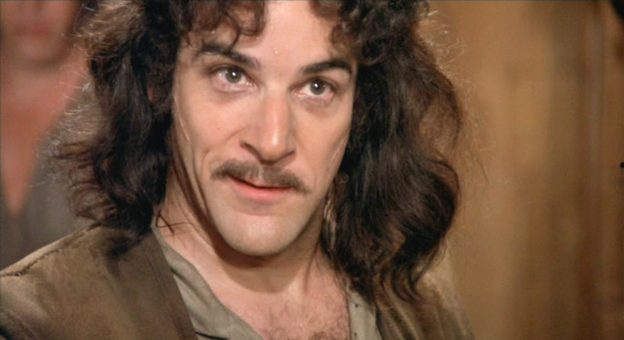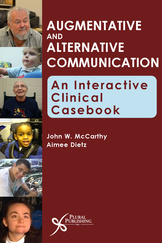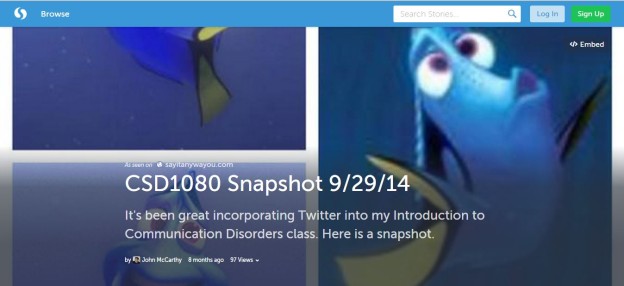Blog
AAC: An Interactive Clinical Casebook
Thanks to Plural Publishing for helping me and Aimee Dietz produce AAC: An Interactive Clinical Casebook for speech-language pathology students and professionals.
Aimee and I set the stage for the resource by considering what it takes to move from being a beginning to an expert clinician.
This was a project 4 years in the making. We are so grateful to the incredible contributing authors for their work and to the people and families willing to share their stories so that students and professionals can learn and grow as a result.
Using Twitter in the Classroom: Snapshot
MedTAPP Summit September 23, 2014
Technology section
I have been in classrooms where cell phones and laptops are strictly prohibited and students who are reading newspapers are also called out to put them away. I’ve been in others where technology is omnipresent and unrestricted. My classroom tends toward the technology side. My compromises deal with blatantly held-up and open newspapers (merits a comment from me) and my “technology section” (keep reading for info).
Although I have a technology “friendly” classroom, one line I do have is for students who may be distracting other students. As such, I ask that students who are using laptops restrict their usage to taking class notes. For those who have multiple windows open, I ask that those students consider the students behind them who might be distracted. Ultimately my policy is that students who have multiple windows open should sit in the back of the class to minimize such distraction. I have likened the technology section to the smoking section. It is a place where people can go recognizing that they may be hurting themselves, but that it is an area where they can do so.
Many policies like this seem to fall under a basic idea of “respect for others” in the classroom. You shouldn’t engage in anything in class that would interfere with someone else’s learning.
Twitter in (and out of) the Lecture Hall
One of my first blog posts was titled “The Death of Discussion Boards.” After using online discussions, for a while, I gave up after fatigue on the part of both me and my students. Students complained about participating and frequently did not read other’s posts. It seemed more like a blog than anything interactive. I used them originally to create a sense of discussion in an electronic forum, but I had lost that feeling. I had never used Twitter before, but became interested in the possibility after attending a conference presentation in 2007. At the time there weren’t great answers as to how exactly to use Twitter, but Twitter users had excitement. After lurking, I decided to try it around discussion of a single topic in a class. I then slowly expanded my use in different classes and more broadly. Some of the issues I confronted were: How do you get students Tweeting? Should everyone be required to Tweet? What is a reasonable expectation for Tweets? How do you handle offensive content that is posted? How do you grade it? What is a good class size? Should you follow students? Should Twitter be for in and out of class?
As I gained experience in using Twitter in and out of the lecture hall I arrived at some of my own insights on these and other questions, and look forward to discussing this with both students and lecturers alike this week on @WeSpeechies.
Choosing a minor to go with CSD #slp2b
My advisees frequently ask me, “What should I minor in?” or “I heard having a minor is a good thing, which minor should I choose?”
I can think of many good reasons to add a minor. Maybe you took a course in an area and decided you would like to learn more. As you take more classes you find that it is of interest to you. If it arises out of your interest, I’ve never known someone to be disappointed. Minors can also be the logical result of a double major that just isn’t feasible for your own personal situation. Ultimately with a double major you frequently need to choose a primary direction anyway, so choosing a major/minor split might be a good way to start figuring it out. In other cases individuals choose minors to complement their major. I think this is fine, but I still think there has to be some kind of personal motivation there. There still needs to be interest, and I would even argue some passion for the topic. A minor still requires a prescribed program of study so following through with all the requirements still takes a commitment on the students’ part. Imagine majoring in something you weren’t particularly interested in. It would be much more difficult to complete. Majors that complement CSD logically can include things like linguistics, communication studies, and psychology, but they could also include physics, nutrition, or another health related field that could add depth or breadth to a CSD major. Just be sure these areas are truly of interest. Because…
There is a reason NOT to minor.
If you are minoring in something not out of your own interest, but out of a desire to distinguish yourself for graduate admissions, this is not a reason to minor in something. As someone who has been on graduate admissions committees and as someone who is now a program director, I look for students who passionately pursue their own interests. Pursuing something just to distinguish yourself to me is more like the student telling me what they think I want to hear. Students who are always looking for “the right answer” may struggle with clinical situations where there isn’t necessarily one single right answer. Whether I agree or not, I want to know what students are interested in. My experience when students minor in something that they aren’t passionate about is that they generally don’t do as well as when they take classes in areas they really like. Consequently they lower their GPA and their distinctiveness rather than increasing it. They then experienced frustration with both the content and their grades. This is a lose-lose situation.
As someone who majored in voice performance, I can tell you that your interests and your passion (as well as your demonstrated ability to perform in CSD classes) is what distinguishes you. Minors are an opportunity to pursue something of high interest to you. Ultimately getting the minor doesn’t even need to be your end goal if you have taken courses of interest. I was three credits short of minoring in Italian. It never held me back that I didn’t complete it (to my knowledge) and I never regretted not finishing the minor because I took courses of high interest, pursued study abroad experiences, but then ultimately decided to study some other languages as well.
I am not saying, don’t minor. I am saying let your minor grow out of your interests whether it is passion for a topic or a desire to broaden your perspective on a topic within CSD (but that is still interest related). Please, please, please, don’t minor in something because you think I want you to. I want to know what you want.
The Ultimate Flip: Intervention First in Teaching SLPs
There has been a lot of discussion of the “flipped classroom.” It generally refers to classroom time being focused on hands on activities while lectures and reading assignments are completed outside the classroom. There is another flip to consider in SLP. The flip of assessment and intervention coverage in the classroom. #slpeeps #slp2b
Assessment drives intervention. I know this. I believe this. It is a critical foundation for AAC practice. You have to understand a person’s needs and skills so that you can appropriately match the technology to those needs and skills. Does your teaching sequence have to match that though? What I intend to explore is the idea that it doesn’t.
Let me lay out several reasons why I’m considering this change:
1. Students don’t get enough time on intervention. There is so much to say about assessment. Good assessments are critical. But if you spend too much time talking about assessment, you may run out of time in the semester to talk about intervention.
I keep hearing from students that they know a lot of how to assess, but don’t feel at all confident when it comes to intervention. This poses a serious problem for them.
2. Expert AAC clinicians are not linear thinkers.
3. Students needs to not be linear thinkers and they are already set up for way too much of it.
4. Students are already doing clinical work in intervention. Frequently they are on either a diagnostic rotation or an intervention one, but there frequently isn’t continuity there for many reasons.
5. Students who transition to work in the school system inherit a caseload. Going back and doing assessment with everyone there would require reengagement of the IEP process, which takes an extended period of time and STILL requires that intervention be done in the meantime.
So how will I accomplish this? I plan to present a case per week where there are intervention goals and activities already illustrated. Students have access to the assessment information as well, but the focus will be on the goals, research related to the intervention technique(s) and programming/ideas for how to implement a goal in a given clinical session or in a given setting. At least one App (probably more) will be discussed with each case. At the end of the course after the students have had some experience seeing intervention, we will discuss assessment. We’ll look at tests/checklists/profiles/informal methods with regard to the cases we have already discussed. They will still be getting all the information.
I am writing this so that I commit to doing this. I have frequently promised to do more related to intervention in my class. Now I am publicly committing to it. Look for future blog posts to see how it turns out or feel free to comment 🙂
What about the hats?
It was graduation weekend. The graduation program has information about the robes and hoods including detailed descriptions of each of the colors and the variants. There is information on the stripes of a doctoral robe. But what about the hats?
Tanya Coyle @SLPTanya was the first to ask about this on Twitter after I posted a selfie of me with some other graduates. We then had a discussion about hats and regalia in general. I knew that my style hat was actually an “upgrade” purchase with my gown. There were different “models” to choose from when I graduated from my Ph.D. program and I elected for the “medium” package which included some stylized accents and rounded hat rather than mortar board style hat.
The same day I had my exchange with Tanya, a unknown person asked me about my hat after the ceremony. Beyond talking about my “upgrade” I really didn’t have any further information. In fact on the third instance when someone asked about the mortar board, I was still without any insight. For me, a three time point of inquiry from different, independent sources within two days calls at least for a Wikipedia search. So that’s what I did…
Evidently my gold tassel is reserved for the doctoral hat. The information is from the American Council on Education according to Wikipedia. Although I frequently thought of my hat as a beret, it actually is a “tam“. In the deep recesses of my memory I seem to recall tam was the box I checked, but I can’t be sure. It also was interesting to learn that in some countries a personalized hat is prepared by one’s workgroup members and reflects one’s area with different trinkets and symbols of the profession. Although the undergraduate ceremony featured a number of customized hat decorations, I did not notice any Ph.D. ones. An interesting tradition. As someone interested in symbolic communication, it is definitely something to think about.
Etiquette for the Classroom: Early and Later Opera
The other day in class, I was pushing the end of the classroom time and some students were getting up to leave. I continued speaking as part of my delivery was relating a few anecdotal experiences. I was trying to deliver them with a more comedic style and even got the occasional laugh. I did not insist that people immediately sit down until I was finished talking. On Twitter some students complained about how rude it was that people were getting up and leaving. Presumably those actually leaving were not on the feed to tweet a reply. This incident got me thinking about classroom culture and my role as a performer. As such I fall back on my singing training and on what I know about the history of opera. I came out with more comparisons than say actual answers, but thought I would share the threads.
As someone interested in singing and classical singing my mom took me to the opera. I learned some things about attending opera (or really classical performances) from attending. I learned a lot about classical singing style, and how a huge variety of stories could be told by singing the entire (or most of) the content. I learned the context of famous arias I had only heard in isolation. I learned other lessons too. The lessons included be quiet, sit still, listen thoughtfully, and the idea that everyone else somehow gets this and if I am bored I may just be either too young or not trying hard enough. Don’t get me wrong, I still enjoyed the performances, but if there were sections that seemed to drag on or were otherwise inaccessible to me, I learned that I still needed to sit there and be quiet. At the very least I should confine myself to looking through the program (as long as I did it quietly). I have more positive memories than negative ones, but the idea of the culture of the performance is an interesting one to me. I always considered opera to be “high culture” where etiquette was extremely important.
I remember how surprising it was for me to learn in college that early opera was more like a show put on in the middle of a mall than it is now in the concert hall. The venues were smaller (maybe even large rooms in someones homes at the beginning) and people played cards, had drinks, talked and generally carried on. The recitatives had clear markings at the end, in part, to alert people that an actual aria was about to start. The arias themselves were chances to show off. Interesting performers were rewarded with the attention of the audience. uninteresting ones were not.
So how did opera go from “all in a night’s entertainment” to “the” nights entertainment? It has been a little while since I studied the history of opera, but my recollection is that over time one of the reasons for the change had to do with larger orchestras and more complex machinery (something that got increasingly complex in some traditions). With the move to the concert hall and a changing audience came new etiquette. I’m sure socioeconomic factors came into play and the system became more and more formalized.
So where is the college classroom on this continuum? I think it varies, but we are certainly not at the point of early opera. In general I believe the expectation is something much more formal. So what is to be done with the student who finds the “performance” dull or inaccessible? Is the best solution to sit quietly and if you don’t like it to find something else quiet to do? Is it the student’s obligation to work hard to educate him or herself to more properly enjoy the performance? Indeed I have found that careful study of an opera before I go greatly enhances my enjoyment and the accessibility of the medium. So is that the bottom line?
In my class my primary objective is that students don’t interfere with the learning of other students. Beyond that I don’t try to be in charge of someone else’s decisions about what they do. If they come in and get something from what I have said, then that is great. I work to give them a quality product. I suppose I land more on the side of the interesting performer. Some days I “nail it” and others I don’t. I’m in charge of me and students are in charge of themselves. They just can’t interfere with anyone else’s path in that regard. I’m not sure how to encourage people to “study the opera” before class. I know that it can be useful for opera and for classes. It was however a realization I came to on my own.











